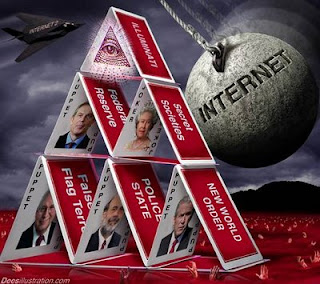Editor’s Note: For additional details about what Matt Ryan correctly calls a “cocktail of attacks” on the free Internet, please read the series of articles by practicing attorney and Activist Post contributing writer, David Makarewicz.
 |
| Dees Illustration |
Matt Ryan — Infowars
AT&T’s pending acquisition of T-Mobile USA has the tech world buzzing with various pros and cons of what this merging would mean for the consumer. Among the pros are the possibility of having a single mobile standard (4G LTE) and a market where phones aren’t restricted to a single carrier. The cons include having less choice between carriers and rate plans, millions of customers suddenly being subject to a more restricted terms of service, and the loss of what T-Mobile customers considered to be a much better overall customer experience.
What’s more troubling, are recent announcements by AT&T to begin capping the monthly usage and impose overage fees on their DSL and U-Verse customers. These customers were originally given a promise of unlimited usage by AT&T only to find an essential mode of communication is now restricted. In a sense, AT&T is forcing their customers to buy in to their cable and phone service to defer the bandwidth used by their online competitors, Skype, Hulu, Netflix, and others.
If you’ve spent time searching for an apartment in the U.S. over the past few years, you may have noticed complexes are beginning to sign contracts with service providers like AT&T, Time Warner, Comcast, and others that forbid their tenants from switching to any other provider than the one they’re under contract with. This deal is offered to landlords in exchange for either what amounts to a kickback or a mock coupon giving their tenants a small discount on service costs. In a sense, you’re subject to your carrier’s restrictive terms and conditions as long as you’re under lease. With some of these contracts, tenants are forced as part of the lease to purchase and maintain a cable and/or Internet service with the carrier. For many in small towns and rural communities where WiMax and other options are impossible, this means you are all but forced to use a carrier’s service, especially when a certain complex is all you can afford.
As we’ve covered here in the past, all signs point to an eventual collapse of the Internet as we know it today. With phone, cable, and web services provided by only a handful select single corporations, more and more Americans are essentially at the mercy of an elite few. AT&T has been in hot water before with privacy advocates, in particular their sharing of private information with the NSA. (Hepting v. AT&T)
This trend to restrict services is even more concerning when coupled with Google and other search engines moves to limit search ranking for news aggregates and other sites they deem to be a “content farm”. This determination is based on the “quality” of a site’s content as determined by the search engine.
Bandwidth is becoming cheaper to the provider, and more expensive for the consumer. This is a complete reverse from what we should expect from any technology-driven industry. In a market where choices are quickly becoming fewer and restrictions on our communication continue to become tighter, it’s becoming clear that communication is becoming both more restricted and more expensive.
Infowars Analysis:
Bottom line, a cocktail of attacks have been launched on the Internet and communication as a whole. The endgame is a transformed Internet run by monopolies that can control access to websites and content, ending the free web as we know it.
linkwithin_text=’Related Articles:’


Be the first to comment on "Strangling of the Free Internet Begins"